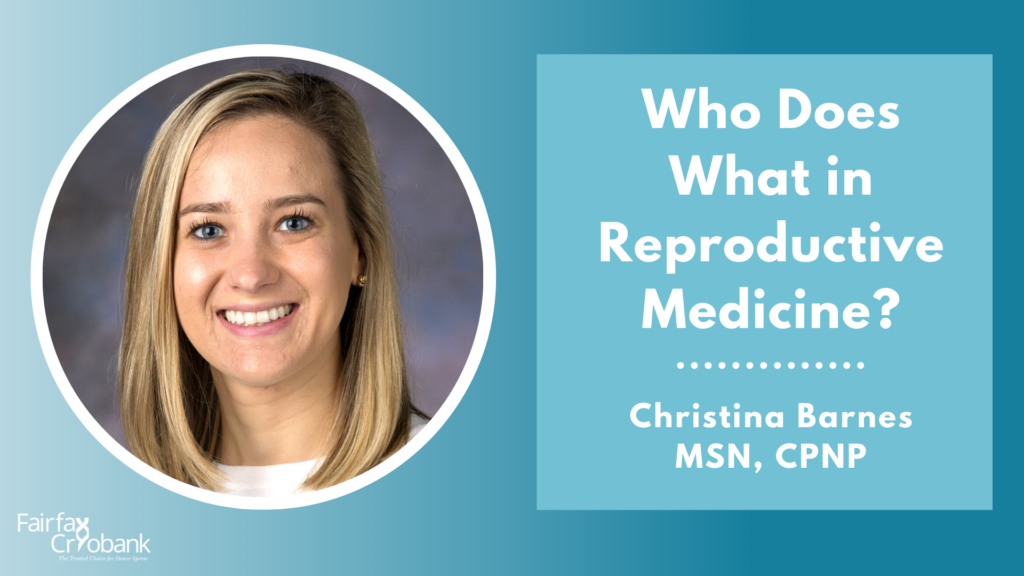Who Does What in Reproductive Medicine?
Guest Blogger, Christina Barnes, MSN, CPNP, breaks down and defines the different roles found in reproductive medicine.

When you need fertility treatments to build your family, understanding what’s involved isn’t always easy. From IVF to IUI to FSH, covering all those terms can feel like learning another language. If you’re still trying to get a handle on what’s what, check out our blog post from April 2021: The Beginner’s Guide to Infertility
Going beyond the terminology, even knowing who does what in the reproductive medicine process can be difficult. To help with that, you’ll find an outline below of the main healthcare providers you may encounter during your family building experience. We’ll cover what area of medicine or science they focus on, what qualifications they have, and how the role applies to you as a patient in your day-to-day life.
Obstetrician/Gynecologist (OB/GYN):
Focus: OB/GYNs care for individuals with female anatomy throughout the lifespan, with a focus on the reproductive system. Gynecology covers reproductive health throughout the lifespan (like your annual pap), while obstetrics covers childbirth and care during and after pregnancy.
Qualifications: An OB/GYN is a board-certified medical doctor who has completed a 4-year OB/GYN residency.
Day-to-Day: If you’re of childbearing age and thinking of becoming pregnant, you likely already see an OB/GYN. If you don’t have fertility issues or a high-risk pregnancy, you will continue care with your regular OB/GYN before, during, and after pregnancy.
Reproductive Endocrinologist:
Focus: Reproductive endocrinology is the science of treating endocrine disorders that cause infertility. Your endocrine system controls your hormones, which are key to creating and maintaining a pregnancy.
Qualifications: A reproductive endocrinologist is an OB/GYN who has completed additional training – in the medical world known as a fellowship – in reproductive endocrinology and infertility.
Day-to-Day: You can see a reproductive endocrinologist at the beginning and throughout your infertility journey. These doctors are experts in assisted reproductive technologies (ARTs) like IVF and egg freezing. They don’t usually deliver babies, so a woman who gets pregnant with the help of a reproductive endocrinologist will go back to her OB/GYN for pregnancy care.
Embryologist
Focus: Embryologists work in the lab handling sperm, eggs, and embryos. They separate healthy sperm and eggs from samples, create embryos for IVF, and freeze eggs and sperm.
Qualifications: Embryologists can have a bachelor’s, master’s, or doctoral degree.
Day-to-Day: As a patient you may not interact with an embryologist, but they are vitally important to the process of creating and caring for samples and embryos.
Maternal-Fetal Medicine
Focus: Maternal-Fetal Medicine doctors take care of women who have high-risk pregnancies, such as women with seizure disorders or other preexisting health conditions. They can also take over OB/GYN care during a pregnancy if a fetus is diagnosed with a defect or health problem.
Qualifications: Officially called perinatologists, these doctors are OB/GYNs who completed additional training in a Maternal Fetal Medicine fellowship program.
Day-to-Day: You may see a perinatologist before pregnancy if you have a condition that will make pregnancy high-risk, such as diabetes, epilepsy, or a history of pregnancy complications. If you develop complications during pregnancy or become pregnant with more than one fetus, your OB/GYN care may be transferred to a perinatologist.

Genetic Counselor
Focus: Genetics is the study of genes and heredity. In simple terms, it deals with the parts of a person that were passed down from previous generations.
Qualifications: Genetic counselors have at least a master’s degree and must pass the American Board of Genetic Counseling.
Day-to-Day: You may see a genetic counselor before or during pregnancy for genetic screening tests to determine your child’s risk of inheriting certain diseases. Genetic counselors can also help order and discuss tests for an existing fetus or child, especially if there is concern for a genetic disease.
Sonographer
Focus: Sonography, commonly known as ultrasound, uses high-frequency sound waves to show tissues and fluid inside the body. A sonographer performs ultrasounds on patients to generate images and reports.
Qualifications: Sonographers can become certified through either an associate’s degree, a bachelor’s degree, or a postgraduate certificate. Sonographers can become further specialized in one of many areas, including obstetrics and gynecology.
Day-to-Day: Some of the many ultrasounds a sonographer can perform throughout the reproductive process include: baseline gynecology scans of the uterus and ovaries, embryo transfer scans, pregnancy ultrasounds, and testicular scans.
Nurse Practitioner
Focus: Nurse practitioners specialize in pediatrics, adults, and/or women’s health in areas ranging from low-risk outpatient to high-risk critical care.
Qualifications: Nurse practitioners are registered nurses who complete a master’s or doctoral degree and pass the board exam(s) specific to their field. NPs in reproductive medicine are usually board-certified in midwifery, women’s health, adult care, or family care.
Day-to-Day: You may see an NP when you visit any of your physicians’ offices; NPs can see patients, prescribe medications, and refer for testing. You can also choose to see an NP instead of a physician for most primary, gynecologic, or pregnancy care.
Nurse
Focus: Nurses work in every specialty and healthcare setting, from home health to hospitals.
Qualifications: Nurses complete an associate’s or bachelor’s degree and pass the NCLEX board exam. Nurses with a specialized focus can take additional board exams to become certified in, for example, High Risk Obstetric Nursing or Maternal Newborn Nursing.
Day-to-Day: With any hospital stay you’ll have a nurse on your care team. Nurses give medications, assist with procedures, and make sure you’re well cared for. Nurses also work in outpatient clinics and procedure centers.
Financial Counselor
Focus: Financial counselors work directly with patients at fertility clinics. They explain the costs of treatment, your financial options, and help you make the most of any insurance benefits you have.
Qualifications: There’s no set degree requirement for this role; it’s more important that financial counselors are compassionate and good communicators. They’re experts at understanding the costs and insurance benefits for different fertility treatments and then explaining those to patients.
Day-to-Day: If you’re undergoing any fertility treatments, you can speak with the clinic’s financial counselor about any packages or payment plans they have, as well as how you can use your insurance benefits.







